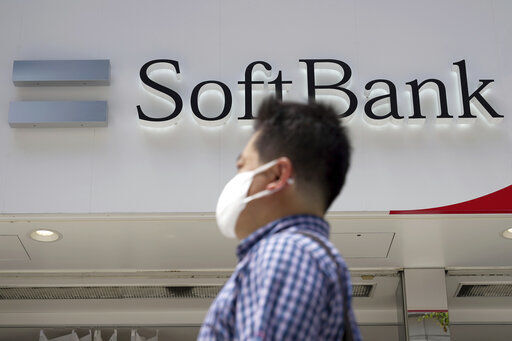TOKYO — Japanese technology company SoftBank Group posted a $23.4 billion loss in the April-June quarter as the value of its investments sank amid global worries about inflation and interest rates.
SoftBank Group Corp.’s loss of 3.16 trillion yen was a reversal from its 762 billion yen profit in the same quarter a year earlier. Quarterly sales rose 6% to 1.57 trillion yen ($11.6 billion).
“I must humbly and honestly acknowledge that things are really bad,” a somber Chief Executive Masayoshi Son told reporters today. “I must face up to this.”
Losses for the last six months totaled about 5 trillion yen ($37 billion), and the latest red ink was the worst quarterly loss since the company’s founding, he said.
For the fiscal year that ended in March, Softbank racked up losses of 1.7 trillion yen ($13 billion), a reversal from the 4.9 trillion yen profit for the previous year. Annual sales grew 10.5% to 6.2 trillion yen ($46 billion).
Although Softbank’s portfolio is not directly exposed to the war in Ukraine, the company warned that global uncertainty as well as inflation and soaring energy costs would likely hurt its profitability.
Much of the dip of the value in shares came from a drop in price of Chinese e-commerce giant Alibaba, in which SoftBank is a major investor. The declining value of the yen also hurt Tokyo-based SoftBank’s bottom line because its borrowings must be repaid in yen.
How long the problems will persist is unclear, Son said, noting it could be months or even years because of global instability and inflation.
Softbank’s intended sale of British semiconductor and software design company Arm to Nvidia failed earlier this year. SoftBank is now promising lucrative future growth at Arm, including an initial public offering, although a date has not been announced for that offering.
SoftBank acquired Arm in 2016. Arm is a leader in artificial intelligence, IoT, cloud, the metaverse and autonomous driving. Its semiconductor design is widely licensed and used in virtually all smartphones, the majority of tablets and digital TVs. Such technology is considered key for autonomous driving cars.
Though Arm remains a bit of a positive for SoftBank, Son said he was not going to gloss over the overwhelmingly devastating results for the latest quarter.
Lower share prices might appear to be an opportunity to buy at bargain basement prices, but Son promised SoftBank will firmly hold back on new investments, cut costs and jobs, and instead focus on the more than 470 companies it’s already invested in, mostly companies focused on artificial intelligence.
He declined to say how many jobs were being reduced.
SoftBank also owns stakes in the SoftBank mobile carrier, Yahoo web services provider and vehicle-for-hire company Didi, which has suffered under a regulatory crackdown in China. SoftBank also has funds that include other global investors called Vision Funds.
Son stressed he still believes in the potential of the Vision Fund investments.
“We believe this is a source of future great wealth,” he said. “But we don’t really know for sure until it happens.”
He said some of the companies were exciting and may benefit humankind, but if dreams are pursued too recklessly, sometimes there is a risk of annihilation.
“And we must avoid annihilation at all costs,” said Son.


